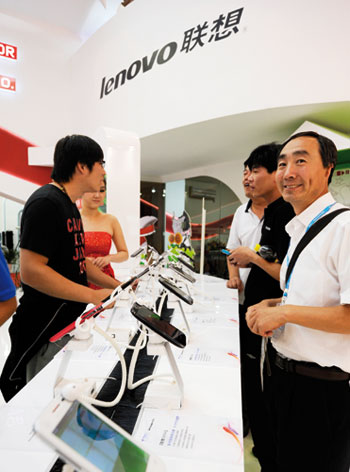
Local brands have grabbed a lion's share of China's cell- phone market but are struggling to make money, market insiders warned.
Industry officials estimate that smartphones will continue to batter the cell-phone market in the coming year, with the Android operating system consolidating its leading position.
Contract phones are tipped to lead the market as handset manufacturers forge closer ties with operators to boost sales.
|
 |
|
Lenovo Group Ltd smartphones displayed at a trade show in Beijing. By November, 70 percent of the handsets sold in China were manufactured by domestic companies. Wang Min / For China Daily |
As of November, 70 percent of handsets sold in China are manufactured by domestic companies, according to a study by Beijing-based Sino Market Research Ltd.
After South Korea's Samsung Group, which topped the list with 15.5 percent of the market share, the second- to fifth-most sold cell phones in China are homegrown brands: Lenovo, Coolpad, Huawei, and ZTE.
A similar ranking is in the smartphone hierarchy, with the Chinese consortium claiming a combined 40 percent of sales.
Samsung leads the smartphone field with 16.3 percent of the market, while Apple Inc's iPhones dipped to sixth with less than 5 percent of the market.
Meanwhile, Chinese firms are struggling to translate their sales success to profits.
Most domestic phone makers are running on zero margin or barely make a profit, said Xu Zhen, a telecommunications specialist with d1net.com, an information technology portal.
He referred to the second-generation Xiaomi phone, a domestic gadget with a quad-core CPU priced at 1,999 yuan ($320), as having a meager 30 percent gross profit, while Apple's iPhone 5 has a profit rate as high as 400 percent.
Henry Lin, chairman of NQ Mobile Inc, a leading mobile security provider, echoed Xu's comments, saying Apple grabbed up to four-fifths of the overall profit gains despite its relatively small volume.
Domestic brands managed to dominate the low- and middle-end market that is highly cost-conscious, putting a dent in their long-term profitability, Lin said.
Xu said the problem is likely to worsen, as almost all Chinese producers use the Android operating system, which has stricter hardware requirements than iOS, the operating system that runs exclusively on iPhones.
"Therefore, local companies need to invest more in hardware upgrades to sustain a smooth user experience. That costs a considerable amount," Xu said.
Related Readings
Global mobile brands find lines busy in China
Q3 smartphone shipments hit record high
Revenue rises 9.2% in China's telecom sector
China's mobile phone users hit 1.1b
 Who wants to date a billionaire?
Who wants to date a billionaire?
 Kitty encounter
Kitty encounter
 Bumper crops mean China can feed itself
Bumper crops mean China can feed itself
 Snow sculptures, a blessing for those braving cold weather
Snow sculptures, a blessing for those braving cold weather
 Winter fishing festival marked in NE China
Winter fishing festival marked in NE China
 Railway to create network of 'city clusters'
Railway to create network of 'city clusters'
 Have fun with Tmall's Lego mascot
Have fun with Tmall's Lego mascot
 Playing at Ice and Snow World in Harbin
Playing at Ice and Snow World in Harbin